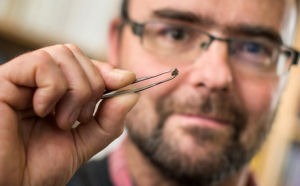
Cornell University researchers studying the auditory system of the plainfin midshipman fish (Porichthys notatus) say they have found a direct line of communication between the part of a vertebrate’s brain that controls the vocal muscle system and the part of the ear that hears sound. The research may shed light on how other vertebrates hear and provide insights into some of the mechanisms that contribute to deafness in humans.
The study focuses on the relationship between the ear and the auditory and vocalization systems of the brain, which makes the plainfin midshipman, one of only a few fish that can vocalize, a suitable subject.
When analyzed closely, the vocalizations can be broken down into a series of impulses separated in time by only milliseconds. The system is timed only to block out sound at the exact moment when the fish vocalizes, leaving the ear sensitive to outside noises during the millisecond gaps when the fish is silent. Once an impulse for vocalization ends, the brain decreases its messages to the ear, which in turn makes the ear more receptive to external sound again. For an instant following a vocalization, the ear may actually become more sensitive than it was prior to the voicing. By better understanding these complex systems, the study offers new avenues for researchers to explore the causes of human deafness.
“Hearing loss is a major pathology that humans deal with,” said Bass. “And we don’t understand that mechanism very well. Observing what these neurons do may offer insights into what leads to hearing deficits.” Interestingly, the study contained absolutely no puns based on the author’s surname.


















Comments are closed.